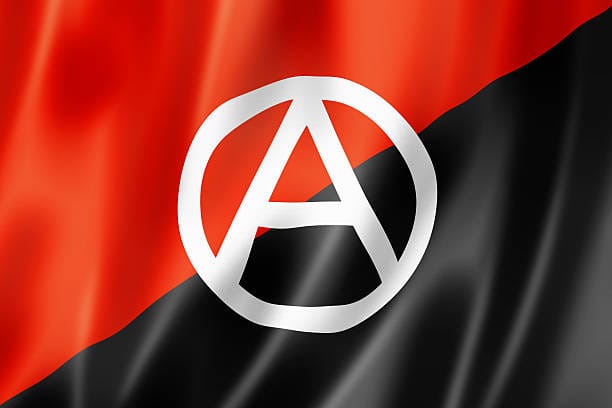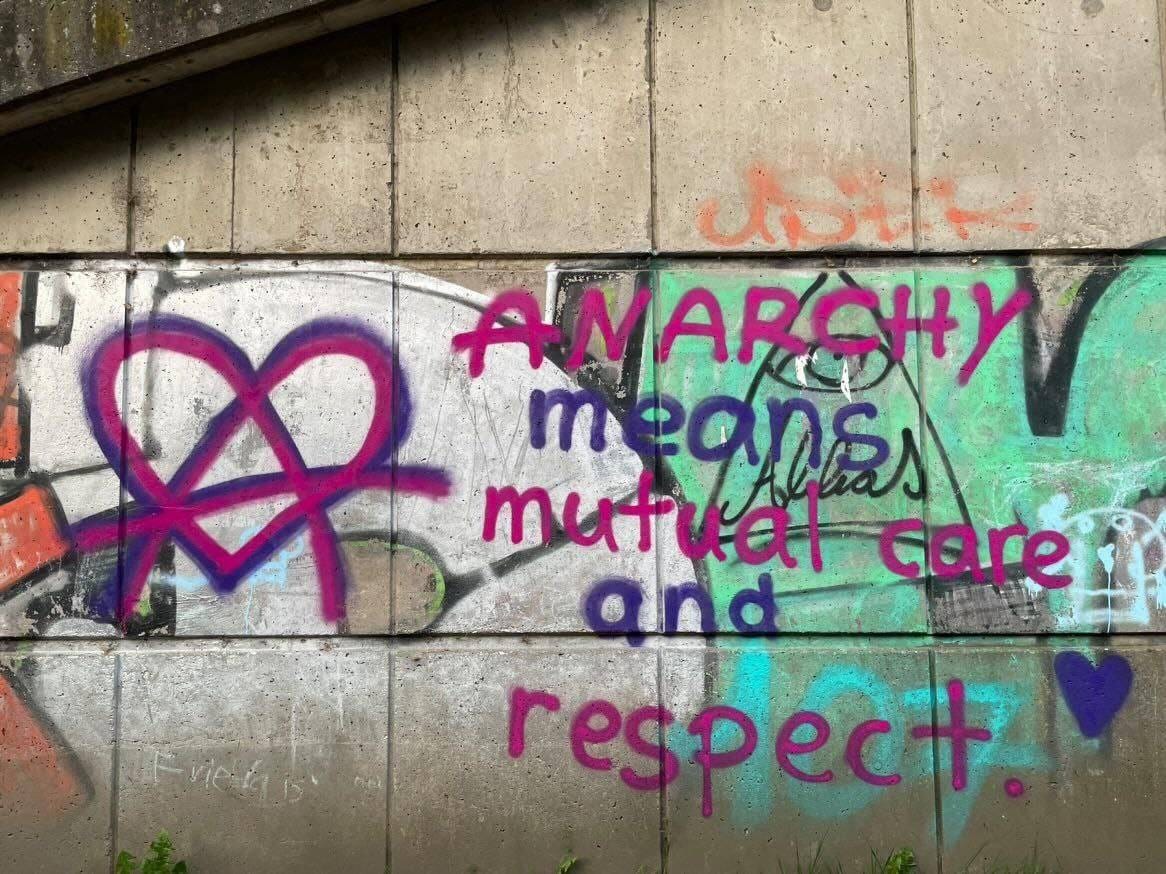The continuing crises caused by capitalism leave ordinary people feeling powerless in the face of powerful interests when, instead, communities could be organised by and for the people who live in them. This may seem obvious to us, but such a system of direct democracy would threaten those concentrations of power protected by the nation state, with its “representative” democracy of careerist professional politicians claiming to solely speak for thousands or even millions of people until the next ballot box election cycle where we choose between one suit or another, red or blue, like Coke and Pepsi; both options bad for us.
“Power corrupts and those who spend their entire lives seeking power are the very last people who should have it.” – David Graeber
Can choosing our masters ever make us free?
Ultimately, the state is another concentration of powerful interests, with its hierarchy of institutions, armed forces, policing over its people, and often punitive welfare systems where, while elites hoard their immense wealth, people scramble for scraps of assistance to experience a life less miserable – assistance that can be withdrawn at the whims of a government whose politicians swap, switch, and change positions, portfolios, and policies in the corridors of power; policies that can remove support for swathes of people with the mere flick of a pen; no sword even needed to commit this kind of violence. And that’s exactly what it is.
"Read and learn. You'll see how many ways there are to kill." - Libertarias
We all tend to agree that refusing to help place food within reach of the needy when we have the chance is still a form of starvation through cruelty of inaction. It causes easily avoidable harm. So these policies are state violence. And there is a term for the perpetrators: desk murderers. These people in power already killed many people, all without ever having to dirty their hands. Austerity continues, yet if the needy take food from a market without paying for it, the state ensures that they are arrested, prosecuted, and punished.
"The greatest crimes in the world are not committed by people breaking the rules but by people following the rules. It’s people who follow orders that drop bombs and massacre villages." - from Wall and Piece by Banksy
The hierarchy of the state means power is concentrated at the top of a centralised system, comprised of people achieving such power usually by having worked with others in powerful positions – perhaps their predecessors, maybe other hierarchical institutions including city councils, cops, or the military. In countries where the state embraces corporatism, many politicians are lobbied or even financed by corporate interests, and even if they happen to have introduced laws to supposedly stop corporate abuse, these big companies can get away with it through a form of legalised bribery known as government fines.
"Never be deceived that the rich will allow you to vote away their wealth." - Lucy Parsons
Even the few anti-capitalist politicians with seemingly good intentions have always historically found themselves at the mercy of powerful interests domestically and/or globally – if not sabotaged or smeared by agents of capitalism, then certainly seduced or trapped by the power of the state; compromised or even corrupted. No surprise, then, that not one has ever succeeded through our entire history. And no government has ever liberated all of its people from oppression – perhaps because centralised power is oppression.
"Our present economic system is more likely to reward people for selfish and unscrupulous behaviour than for being decent, caring human beings. ...Most people don’t think there’s anything that can be done about it, or anyway — and this is what the faithful servants of the powerful are always most likely to insist — anything that won’t end up making things even worse. But what if that weren’t true? And is there really any reason to believe this? When you can actually test them, most of the usual predictions about what would happen without states or capitalism turn out to be entirely untrue. For thousands of years people lived without governments. In many parts of the world people live outside of the control of governments today. They do not all kill each other. Mostly they just get on about their lives the same as anyone else would." – David Graeber
"By virtually any standard – geographic, economic, cultural, technological – the modern State has been more successful than any previous system at imposing itself on humanity and the earth," explained Eric Laursen in the book The Operating System. "Over five centuries, it has harnessed capital, labour, science and technology, and firepower to remake almost the entire world through conquest, slavery, innovation, economic exploitation, the subjugation or evisceration of societies that followed other models, the systematic stripping of the planet's natural resources, and the inculcation of its worldview into every one of us." He continued: "These were not by-products or unintended consequences. They also didn't have to happen. But these practices were integral to the State's goals and ambitions; they are part of its DNA. In the past century, the atrocities have grown in magnitude as the State has grown more powerful: over six million killed in Nazi Germany's death factories, millions imprisoned and dead in the forced labour camps of the Soviet Union and Maoist China, and an unprecedented incarceration boom in the United States that's created a powerful new private industry of prisons and detention centres."
History has judged the state and the verdict is damning indeed. When we think of Joseph Stalin or Adolf Hitler, or even Donald Trump, we know that their incredible power, oppressive might – and atrocities – were only ever possible because of something we have quite remarkably been conditioned to take for granted: the state. It's time to recognise and utilise a different way of organising societies in a fair and sustainable way. Our very survival depends on it, because little time remains. The next promising politician making promises that can never be realised through the state essentially threatens that survival by diverting, and absorbing, our limited energies into long voting drives where we're offered "the lesser of evils" at worst and, at best, a single seemingly well-intended politician who is destined for failure – like all others before them. It's the same thing, over and over again, while irrationally expecting different results.
"The long project of the state and capitalism has been to make people dependent on their institutions for basic necessities instead of determining their lives for themselves. So in a way, the shape of our lives 'needs' the state – but we don't get to determine that shape or prioritise other needs. In other words, the state causes the problem and then purports to fix it – while always decreasing the actual resources it gives us. We should take all we can from the state, no question; but we must also imagine ways of living that don't depend on an external centralised authority imposing its structure on us to keep us orderly and complacent." - Shuli Branson, Practical Anarchism
A beautiful idea
While people for years have argued with one another about political parties across the spectrum, it turns out that the biggest problem wasn’t to be found on a horizontal line of “left” or “right” politicians in the halls of power, but at the top of a vertical line – of those holding power over the working class “subjects” or “citizens” beneath them. Yes: the problem was a concentration of power itself. A line must never be vertical, and only be horizontal when it’s endlessly representing all people, essentially joined in a circle.
"Most of us have little experience in groups where everyone gets to make decisions together, because our schools, homes, workplaces, congregations, and other groups are mostly run as hierarchies. Our society runs on coercion. You have to work or go to school and follow rules and laws that you had no say in creating, whether you believe in them or not, or risk exclusion, stigma, starvation, or punishment. We do not get to consent to the conditions we live under. Bosses, corporations, and government officials make decisions that impoverish most people, pollute our planet, concentrate wealth, and start wars. We are only practiced at being allowed to make decisions as individual consumers, and rarely get practice making truly collective decisions. We are told we live in a system of 'majority rule,' yet there is rarely anyone to vote for who is not owned by – or part of – the 1 percent, and the decisions those leaders make do not benefit the majority of people." - Dean Spade
Direct democracy – and not state socialism, which has, throughout history, given us aggressive power blocs and forced labour camps – is true socialism, where people literally decide for themselves on how their communities are organised. It is often called libertarian socialism…or simply anarchism: yes, a scary-sounding term for the establishment media, maybe, but in fact the word “anarchism” derives from the ancient Greek word anarchia, which basically means “without leader” or “without authority.” No lines, only circles.

"People always say anarchy can't work because you can't trust people to rule themselves. To which I've always said, if people are untrustworthy as all that, how can you trust them to rule one another? You can't." ― Margaret Killjoy, The Lamb Will Slaughter the Lion
Pierre-Joseph Proudhon once stated that “anarchy is order without power,” a phrase that many understandably assumed to have inspired the symbol of the letter “A” inside a circle. After all – as its brief history has already demonstrated – capitalism brings us terror, corruption, and complete chaos, so despite what its defenders claim about anarchy, it is anarchism that offers us order and freedom from tyranny at long last: in fact, a world without leaders, states, or borders; a world opposed to hierarchical structures; a world with “work” and finance replaced by simple acts of communal care; a world in which individuals can collaborate together to create and control their own collective organisations federated and democratically coordinated (rather than competing) with one another; a world where communities act locally but think globally; a world without desperation, crime, police, prisons, or powerful institutions, and where people’s needs are met through the principle of mutual aid, alongside community support systems, conflict resolution, restorative and transformative justice…and direct democracy.
This is why anarchism has long been referred to as “the Beautiful Idea.”
"Unlike representative government, consensus decision-making lets us have a say in things that matter to us directly, instead of electing someone who may or may not advocate on our behalf. Consensus decision-making is a radical practice for building a new world not based on domination or coercion." ― Dean Spade
Such concepts are, of course, fundamentally based on inclusion, care, and non-violence and yet, as innocuous as all that may seem, those of us who promote them and participate in them are often targeted and demonised by the state – so incredibly threatened states are by such programmes’ potential to de-legitimise, undermine, and even replace the state itself. It’s why the rise of fascistic right-wing violence is generally greatly ignored. It’s why, instead, peaceful campaigners can be called “domestic extremists,” cute bookstores can be considered “hotbeds for terror plots,” an activist can be imprisoned simply for attending an “anti-state dinner,” an urban farm can be raided for “conspiring” to provide compost toilets and a wheelchair track to a peaceful climate camp, and it’s why the free breakfasts provided by the Black Panthers were considered a “security threat.” As Shuli Branson pointed out in the book Practical Anarchism: “The state will object to even simple kindness or humane treatment if it isn't concentrated through its own power.”
“The only people who are actually afraid of these collective ways of organising are the politicians, cops, and corporations who seek to preserve their absolute power over humanity. If we had ways of living more collectively, satisfied our needs through mutual aid, and had solidarity with each other, people may realise they don’t need the state or capitalism, and they may realise that the greatest causes of human suffering and barriers to freedom and security are the state and capitalism.” - statement from 12 of the 61 people indicted on RICO charges in Atlanta
There is hardly any wonder Elon Musk, his capitalist class, careerist politicians and presidential candidates are so deeply offended by such harmonious, horizontal ways of organising society: these ways mean less power for such interests, and instead ordinary people doing things and deciding for themselves, rendering the current system of hierarchy completely exposed, and ultimately useless.
For now, the current system means these interests call all the shots. At its worst, the state itself actively stamps out such solidarity (which is unconditional and horizontal), while at best promotes charity (which often has conditions and is hierarchical). The state is defined by power itself. And, of course, power protects itself.
"Existing political elites and the ruling classes have a vested interest in keeping things as they are, even if that means the continued murder of Black people by police, foreign military intervention, and a dangerously escalating climate crisis. They will not voluntarily give up power and share the wealth, as has been demonstrated throughout history." - Dana Ward and Paul Messersmith-Glavin

Of course, it is crucial that working class people organise now – in non-hierarchical unions such as the Industrial Workers of the World, and the Solidarity Federation, moving towards workers’ cooperatives, as well as groups like renters unions and radical communal care collectives – embracing an inter-communal, internationalist, and intersectional anti-capitalism that understands and embraces the varying and unique levels of oppression experienced by different communities.
These examples of working class solidarity are, at the time of writing, often quite small organisations in the grand scheme of things – and that’s why, once again, information is absolutely crucial in raising awareness of the futility of the current system as well as these alternative ways we can effectively de-legitimise the system, undermine the system and, yes, ultimately replace the system: building the new world in the shell of the old.
“We have nothing but our freedom. We have nothing to give you but your own freedom. We have no law but the single principle of mutual aid between individuals. We have no government but the single principle of free association. We have no states, no nations, no presidents, no premiers, no chiefs, no generals, no bosses, no bankers, no landlords, no wages, no charity, no police, no soldiers, no wars. Nor do we have much else. We are sharers, not owners. We are not prosperous. None of us is rich. None of us is powerful. If it is [anarchism] you want, if it is the future you seek, then I tell you that you must come to it with empty hands. ...You cannot buy the Revolution. You cannot make the Revolution. You can only be the Revolution. It is in your spirit, or it is nowhere.” ― Ursula K. Le Guin, The Dispossessed


